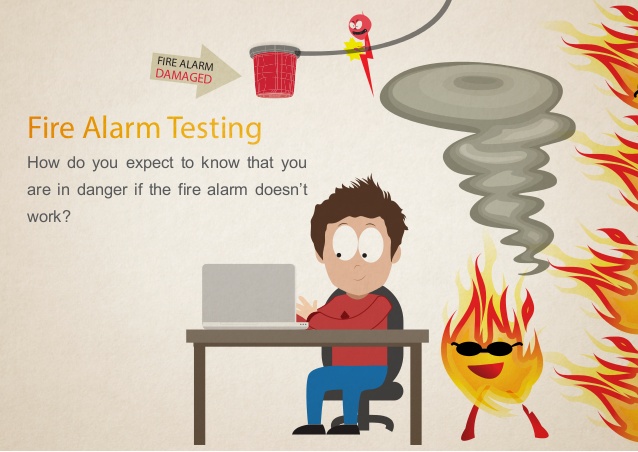The main thing to know about fire alarm testing is that certified CFSA technicians should always conduct the testing. Once you’ve established a suppression system and have installed fire detection and alarms, you will need to have regular inspections conducted by professional experts. During the testing of your system, any faulty components that have currently been in operation will be exposed, which thereby reduces the risk of potential fires and damages. Regular inspection and maintenance of a fire suppression system does not only help to ensure that you remain in keeping with in-house safety standards and requirements set by the local fire department but could also result in a cost savings in your insurance policy.
Periodic Inspections
Annual inspections must always be conducted according to code and suppression systems should be tested every six months. Depending on the size of the building, it may be necessary to partake in monthly inspections. For example, in a very large building, certified technicians will go in and test 10% of the smoke detection system per month, each time coordinating a different zone of the system.
The Many Good Reasons for Testing
Fire alarm effectiveness is one of the most important concerns that face the owner of a building. It is important not to allow financial concerns and scheduling conflicts hamper your desire to conduct fire safety testing in the way that is needed and required. Building owners who’ve hired engineers and designers should create an article in business agreements that would make it mandatory for the engineer of record to test the alarm system. At any time, the fire alarm system could become compromised, either during installation or most frequently, once it’s installed. System tests that are conducted when first installed will confirm whether or not the installation has met all of the requirements as determined in the NFPA 72, as well as any other related standards and codes. This initial testing must also prove that the fire safety system is operating in the proper sequence according to safety guidelines. Following the testing service, the engineer will need to issue to the owner, a comprehensive ledger of the testing that was conducted, a copy of which should also be given to the contractor and the AHJ. Records of this testing should be preserved and held in the case that they are needed for legal defense in a court of law.
Residential vs Commercial Fire Alarm Testing
Both residential housing units, single stories, and large apartment buildings, as well as commercial buildings such as office buildings, retail/restaurants, industrial buildings, and other nonresidential buildings like hotels, hospitals, and storage facilities, require different types of fire alarm testing. On residential sites, photoelectric alarms and ionization detectors are the most commonly used. Photoelectric alarms are best at detecting smoldering fires while ionization detectors tend to be better at picking up flaming fires. Smoke alarms that run from the main energy supply are becoming more common, though the battery operated smoke alarm is still widely in use. These types of detectors are especially dangerous since when the battery runs out or weakens, so does its detection capability, and the alarm will not go off. Under the rules, a residential building does not need to have a smoke alarm unless renters are present, in which case the property owner must provide and maintain an operable smoke alarm, each unit having its own heat or smoke alarm. Testing fire alarm systems under these circumstances then, should take place once per week. Commercial alarms, on the other hand, can vary in type, depending on the type of business and applicable safety requirements. Due to the larger coverage area, fire alarm systems should be interlinked together and connected to a central control panel. Commercial detectors must utilize instruments for both smoke and heat and there is quite a bit of legislation requiring testing and regular maintenance for commercial spaces, which normally contain greater numbers of people. However, a professional service technician should be consulted for commercial fire alarm protection.
Another way to think of fire alarm testing
Much of what is plaguing property owners and occupants is the smoke and smoke inhalation as opposed to the fire. In fact, smoke inhalation is responsible for fire hazard deaths far more often than from burning. During a calamity, there is usually such a thick and heavy profusion of smoke that people in the vicinity are forced to inhale it, which incapacitates the occupants so that they are unable to make it to the exits. The fire alarm and detection systems must work comprehensively to warn people in the vicinity about a fire so that they can safely vacate in enough time, preferably during the earliest stages of the fire. It must also be early enough to notify firefighters/ first responders so that they will be able to begin addressing and containing the fire itself, which could help to preserve your assets. A system that automatically sends information to responders, including the location of the fire, increases the speed of control. Testing also helps to prevent false alarms, which may cause occupants and/or employees to not take the sounding of the alarm seriously. They may ignore the alarm until it’s too late to exit the building. For these reasons, fire alarm systems must be tested to ensure that they’re operating at a 100% performance level.
